| Srl | Item |
| 1 |
ID:
130567
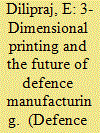

|
|
|
| 2 |
ID:
131068
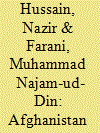

|
|
|
| 3 |
ID:
130243
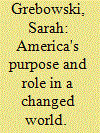

|
|
|
|
|
| Publication |
2014.
|
| Summary/Abstract |
I'll never forget my brief and ill-received show of American patriotism as a young expatriate in Beirut. It was the summer of 2010, and the city was teeming with convoys of Lebanese youth honking and waving flags to celebrate their favorite teams' victories in the World Cup. After an exciting win by the US, I joined a group of Americans in a street celebration. But cruising down the main thoroughfare of West Beirut, our procession of stars and stripes was met with disapproving looks. The image that remains with me to this day is that of an older man standing silently with his shoe in his hand. The tattered sole was pointed directly at us, an expression of disrespect in Muslim culture. We recognized the gesture's meaning only because a similar shoe had been thrown at the American president's head a year earlier.
Today's generation of young Americans, known as the millennials, has come of age at a time when America has been humbled on the world stage. Many of them have traveled extensively at a young age and experienced this diminished reputation firsthand. Their parents and grandparents believe that America has been a remarkable force for good in the world and that the country should not lose sight of its responsibility to shape events globally because of mistakes made in the last decade. But millennials seem more fixed on the limits of American power and disenchanted with ideas of American exceptionalism.
Because of these reservations, the millennial generation is often described as declinist or isolationist. I disagree. Young Americans care more than any other age group about what happens beyond our borders. Millennials tend toward multilateralism and the cautious use of force, and perhaps would be more selective in committing US resources overseas. But far from an abdication of global leadership, this prudence may prove to be the silver lining to millennials' crisis of confidence in America's role as, in President Obama's words, "not just a place on a map, but the light to the world."
|
|
|
|
|
|
|
|
|
|
|
|
|
|
|
|
| 4 |
ID:
097752
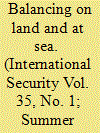

|
|
|
|
|
| Summary/Abstract |
Scholars often interpret balance of power theory to imply that great powers almost always balance against the leading power in the system, and they conclude that the absence of a counterbalancing coalition against the historically unprecedented power of the United States after the end of the Cold War is a puzzle for balance of power theory. They are wrong on both counts. Balance of power theory is not universally applicable. Its core propositions about balancing strategies and the absence of sustained hegemonies apply to the European system and perhaps to some other autonomous continental systems but not to the global maritime system. Sea powers are more interested in access to markets than in territorial aggrandizement against other great powers. Consequently, patterns of coalition formation have been different in the European system and in the global maritime system during the last five centuries. An empirical analysis demonstrates that counterhegemonic balancing is frequent in Europe but much less frequent in the global system. Higher concentrations of power in the global system lead to fewer and smaller rather than more frequent and larger balancing coalitions, as well as to more frequent and larger alliances with the leading sea power than against it.
|
|
|
|
|
|
|
|
|
|
|
|
|
|
|
|
| 5 |
ID:
097753
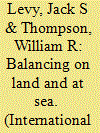

|
|
|
|
|
| Publication |
2010.
|
| Summary/Abstract |
Scholars often interpret balance of power theory to imply that great powers almost always balance against the leading power in the system, and they conclude that the absence of a counterbalancing coalition against the historically unprecedented power of the United States after the end of the Cold War is a puzzle for balance of power theory. They are wrong on both counts. Balance of power theory is not universally applicable. Its core propositions about balancing strategies and the absence of sustained hegemonies apply to the European system and perhaps to some other autonomous continental systems but not to the global maritime system. Sea powers are more interested in access to markets than in territorial aggrandizement against other great powers. Consequently, patterns of coalition formation have been different in the European system and in the global maritime system during the last five centuries. An empirical analysis demonstrates that counterhegemonic balancing is frequent in Europe but much less frequent in the global system. Higher concentrations of power in the global system lead to fewer and smaller rather than more frequent and larger balancing coalitions, as well as to more frequent and larger alliances with the leading sea power than against it.
|
|
|
|
|
|
|
|
|
|
|
|
|
|
|
|
| 6 |
ID:
131995


|
|
|
|
|
| Publication |
2014.
|
| Summary/Abstract |
Within the scholarly debate on the current power transition in the international system, particular importance is attached to China's economic rise and the global shifts it is bringing forth in material primacy. A thorough understanding of these shifts in the relative distribution of power, however, requires leaving the narrow path of material capabilities and looking at normative accounts as well. Taking up this challenge, the article focuses on the political dimension of China's rise by exploring the country's alignment with South American governments along two dimensions: the convergence of their foreign policy ideas and the provision of diplomatic links facilitating their cooperation and coordination in global politics. The empirical analysis depicts a nascent global agenda forming between China and certain South American countries and shows that, along with growing levels of foreign policy compatibility, China has also advanced its diplomatic inroads into the region, particularly at the level of bilateral relations. Taking these developments as a whole, it is suggested that China has gained international attraction in terms of its visions of global order and as a potential political partner throughout the region. The article concludes with a discussion of the findings in light of the ongoing relative shifts in the distribution of global power beyond material primacy, and the prospects for China's further political rise.
|
|
|
|
|
|
|
|
|
|
|
|
|
|
|
|
| 7 |
ID:
079584
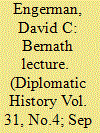

|
|
|
| 8 |
ID:
131627
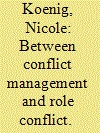

|
|
|
|
|
| Publication |
2014.
|
| Summary/Abstract |
This paper assesses the role of the European Union in the Libyan crisis (2011) and critically considers the implications for its evolution as an international security actor. Employing role theory, the paper reviews the historical development of the Union's security actorness and sheds specific light on the balance between self-conception and external expectations in the case of the Libyan crisis. Its central argument is that, despite external expectations and European narratives of a 'comprehensive power role', the Libyan crisis showed that the Union still acts in line with its traditional role as a civilian power. The inability to go beyond civilian power stemmed from internal dissonance on a potential hard power role and a corresponding lack of material capabilities. The growing gap between expectations about comprehensive actorness on the one hand and performance on the other is likely to damage the Union's future credibility as an international security actor.
|
|
|
|
|
|
|
|
|
|
|
|
|
|
|
|
| 9 |
ID:
163416
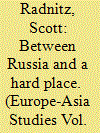

|
|
|
|
|
| Summary/Abstract |
This essay asks how Central Asian states have responded to Russia’s intervention in Ukraine and salvos against the West, as a means to assess how Russia and the Central Asian states understand their national interests and exercise state power. It argues that the post-Soviet region shares a cynical and geopolitically driven view of the exercise of global power. Yet Russia has sometimes deployed its resources to advance short-term ideological objectives, whereas Central Asian foreign policy is pragmatic and opportunistic. The Ukraine crisis threatened to coerce the Central Asian states into conformity with Russia’s interests; ironically, their dependence on Russia has enabled their freedom of action in foreign policy, within limits. The essay highlights the ways that geography enables and constrains the execution of foreign policy, and considers the ambiguous role ideology plays in the formulation of national interests and the prospects for international cooperation.
|
|
|
|
|
|
|
|
|
|
|
|
|
|
|
|
| 10 |
ID:
133292
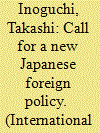

|
|
|
|
|
| Publication |
2014.
|
| Summary/Abstract |
Japanese foreign policy is at a crossroads. A global power transition is under way; while the United States remains the leading global power, across the globe non-western developing states are on the rise. Within Asia, China is a growing presence, wielding expansive claims on islands and maritime rights, and embarking on a defence buildup. As power shifts across Asia and the wider world, the terms of leadership and global governance have become more uncertain. Japan now finds itself asking basic questions about its own identity and strategic goals as a Great Power. Within this changing context, there are three foreign policy approaches available to Japan: (1) a classical realist line of working closely with the US in meeting China's rise and optimizing deep US engagement with China by pursuing a diplomacy focused on counterbalancing and hedging; (2) a transformative pragmatist line of rejuvenating itself through Abenomics and repositioning itself in East Asia; and (3) a liberal international line of pursuing a common agenda of enhancing global liberal-oriented norms and rules through multilateral institutions along with the United States and the Asia-Pacific countries. Current Japanese foreign policy contains a mix of all three approaches. The article argues that a greater focus on the second and the third lines would enhance the current approach; it would ensure that Japan is more in harmony with the global environment and help it work positively for global and regional stability and prosperity, thus enabling Japan to pursue an 'honorable place in the world' (as stated in the preamble to its constitution).
|
|
|
|
|
|
|
|
|
|
|
|
|
|
|
|
| 11 |
ID:
154607
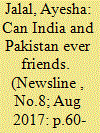

|
|
|
| 12 |
ID:
120538
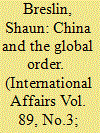

|
|
|
|
|
| Publication |
2013.
|
| Summary/Abstract |
Although there is clear dissatisfaction in China with the nature of the current global order, it is hard to find a clear and coherent Chinese vision of what an alternative world might look like. This is partly a result of conflicting understandings within the country of the benefits and drawbacks of taking a more proactive global role and perhaps undertaking more leadership functions. But it is also a consequence of how elites frame Chinese interests and demands in different ways for different audiences.
Furthermore, the existing order has in fact served China quite well in its transition towards becoming a global power. So while at times China appears to be the main driver for reform and change, at other times (or to other people) the emphasis is on China as a responsible stakeholder in the existing system.
How others receive and interpret these conflicting signals is likely to be influenced by the way China exercises, rather than talks about, its growing power - perhaps most notably in terms of its territorial claims in the South and East China Seas and its role as a regional power.
|
|
|
|
|
|
|
|
|
|
|
|
|
|
|
|
| 13 |
ID:
112185
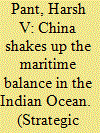

|
|
|
| 14 |
ID:
139347
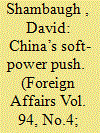

|
|
|
|
|
| Summary/Abstract |
As China’s global power grows, Beijing is learning that its image matters. For all its economic and military might, the country suffers from a severe shortage of soft power. According to global public opinion surveys, it enjoys a decidedly mixed international image. While China’s economic prowess impresses much of the world, its repressive political system and mercantilist business practices tarnish its reputation. And so, in an attempt to improve perceptions, Beijing has mounted a major public relations offensive in recent years, investing billions of dollars around the world in a variety of efforts.
|
|
|
|
|
|
|
|
|
|
|
|
|
|
|
|
| 15 |
ID:
120935
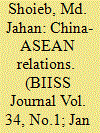

|
|
|
|
|
| Publication |
2013.
|
| Summary/Abstract |
Asia-Pacific region is an important part of the globe as competing interests of big powers often generate conflict to the ground. Over the past decade, the world has witnessed rapid development between Association of South East Asian Nations (ASEAN) and China. Historically China tries to maintain a very good relation with its neighbouring countries. When China was the middle kingdom in 1300A.D.-1900 A.D., it maintained a very close tie with its neighbours. China is rising again as a formidable global power; and its rise is one of the most critical developments in the contemporary world. In the eve of rising, China gives value to the relationship with the ASEAN. Since the beginning of ASEAN in 1967, China maintained relations with the regional association. However, it was the late 1980s that China started to intensify its efforts to establish diplomatic relations with ASEAN member states. In recent years, both are closer to each other than before. Even though, differences exist between the two; for example, the case of South China Sea. Their relations are more focused on economic cooperation; however, strategic partnerships continue. This paper studies phase-wise trends, and critical issues of ChinaASEAN relations.
|
|
|
|
|
|
|
|
|
|
|
|
|
|
|
|
| 16 |
ID:
080420
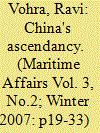

|
|
|
| 17 |
ID:
144204
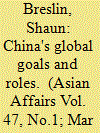

|
|
|
|
|
| Summary/Abstract |
Whilst there is a general acceptance amongst Chinese analysts that the country's global power has really increased (and for very good reasons), how best to use this power to generate real change in the global order remains a subject of considerable debate. The nature of that international order itself is a key determinant of what China can do. On one level the rise of new powers is leading to a depolarised order with fluid and changing alliances that create possibilities for China to build partnerships for change. But on another level, the residual power of the US creates clear limits on what can be done. This creates a rather unique set of circumstances where a partially dissatisfied rising power has to try to find ways to responsibly change (but not fracture) the existing system as self-perceived No.2, with the No.1 rather reluctant to accept the No.2's agenda.
|
|
|
|
|
|
|
|
|
|
|
|
|
|
|
|
| 18 |
ID:
110283
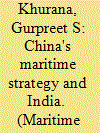

|
|
|
| 19 |
ID:
100614
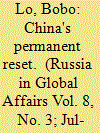

|
|
|
| 20 |
ID:
133811
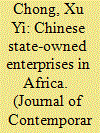

|
|
|
|
|
| Publication |
2014.
|
| Summary/Abstract |
The role of Chinese state-owned enterprises (SOEs) in Africa is puzzling: they pioneered China's inroads into Africa and shouldered the responsibilities of building and expanding cooperation with African countries, while these very activities and engagement, according to many scholars, often contradict or even undermine the political and diplomatic objectives adopted by the central government. To understand this puzzle, this article unpacks China's engagement in Africa, by examining large central SOEs in the resources and infrastructure sectors. It concludes that the commitment of large SOEs in Africa relies on small public and private contractors. The paradox therefore is, that while the central government encourages and supports the large SOEs to 'go global', it has limited capacity to control and regulate the small contractors.
|
|
|
|
|
|
|
|
|
|
|
|
|
|
|
|